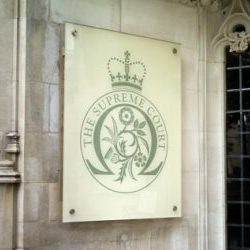By Esmaeil Momeni, litigation team lead solicitor, and Ovye Affi, a solicitor, at Manchester firm Consumer Rights Solicitors, which acts on two of the three motor finance cases going to the Supreme Court

Supreme Court: Is government intervention morally justifiable?
On 25 October 2024, the Court of Appeal delivered a landmark judgment in three conjoined motor finance undisclosed commission appeals: Johnson v FirstRand Bank Limited, Wrench v FirstRand Bank Limited, and Mr and Ms Hopcraft v Close Brothers Limited [2024] EWCA Civ 1282. These cases concerned the payment of commission to car dealers acting as brokers arranging finance for their customers.
All three claimants were financially unsophisticated consumers with relatively low incomes who engaged car dealers as their credit brokers to arrange finance to purchase a vehicle. All claimants contended that the car dealers, who were also brokers regulated by the Financial Conduct Authority, were under a duty to provide them with information, advice, or recommendations on an impartial basis, and that the dealers were acting as their agents in relation to the finance.
Following a three-day hearing, the Court of Appeal held, among other things, that car dealers acting as credit brokers owed their customers a fiduciary duty, which arose in tandem with and as a consequence of there being a disinterested duty. Therefore, if commission was not disclosed, or if the disclosure was insufficient to negate its secrecy, then the commission payment constituted a bribe.
This judgment was in line with the binding authority of Wood v Commercial First Business Ltd [2021] EWCA Civ 471, in which David Richard LJ stated: “I conclude from these authorities that the suggested requirement for a fiduciary relationship is no more than saying that, in the type of case with which we are concerned, the payee of the bribe or secret commission must owe a duty to provide disinterested advice or recommendations or information. As I said earlier, it is the duty to be honest and impartial that matters.”
Aggrieved by the decision of the Court of Appeal, both lenders sought permission to appeal from the UK Supreme Court (UKSC) against the decision of the Court of Appeal. The UKSC granted permission to appeal on 11 December 2024 and announced that the hearing would take place for three days, commencing 1 April 2025.
Intervention by HM Treasury

Esmaeil Momeni
On 21 January 2025, the UK government through HM Treasury (HMT) applied for permission to make submissions as an intervener in the appeal. The application was made under rule 26 of the UK Supreme Court Rules 2009.
The government intervention is an effort to shield the motor finance industry. A principal point of concern is that HMT’s intervention seems to suggest that the Supreme Court should consider extrajudicial factors in reaching its decision.
A central consideration is the extent to which governmental intervention may pose a threat to the fundamental principle of the separation of powers. A necessary preliminary step toward a thorough understanding of this issue is a consideration of the doctrine of the separation of powers and its historical origin.
Establishment of the UK Supreme Court
The UKSC was established in October 2009 under the Constitutional Reform Act 2005. It directly replaced the constitutional functions of the Appellate Committee of the House of Lords, which previously sat as the apex or final appeal court in the UK’s constitution.
The UKSC’s role is to ensure the law is correctly interpreted and applied and the legal limits on the powers of public institutions are respected.
The Act had three main objectives. First, it aimed to eliminate the practice of Law Lords and other senior judges simultaneously functioning as both a judicial and a legislative body.
Second, it sought to separate the functions of the Lord Chancellor and to ensure that the holder of the office no longer simultaneously performs three functions in the three arms of government, as a senior member of the executive, the head of judiciary and the speaker of the House of Lords. Third, it aimed to create an independent Judicial Appointments Commission.
Therefore, the Act shaped the doctrine of the separation of power which is fundamental for all democratic countries in this century.
The separation of powers
The doctrine of the ‘separation of powers’ requires that the different forms of state power should be functionally independent of one another. There are broadly three recognised forms of state power (otherwise known as branches of government) which should be exercised separately but in the general interest of the state: (a) the legislative branch (b) the executive branch (c) the judicial branch.
This separation of the branches of government ensures that a person or group of persons do not wield absolute state power. In other words, separation of powers ensures checks and balances in the exercise of governmental power.
Lord Neuberger of Abbotsbury PSC in Regina (UNISON) v Lord Chancellor [2017] UKSC 51 provided an overview in respect of the doctrine of separation of powers.
He stated: “Parliament exists primarily in order to make laws for society in this country. Democratic procedures exist primarily in order to ensure that the Parliament which makes those laws include Members of Parliament who are chosen by the people of this country and are accountable to them.
“Courts exist in order to ensure that the laws made by Parliament, and the common law created by the courts themselves, are applied and enforced. That role includes ensuring that the executive branch of government carries out its functions in accordance with the law. In order for the courts to perform that role, people must in principle have unimpeded access to them.”
To understand the reason for the creation of this principle, John Locke states in his Second Treatise of Government (1690): “It may be too great a temptation to human frailty, apt to grasp at power, for the same persons who have the power of making laws, to have also in their hands the power to execute them, whereby they may exempt their selves from obedience to the laws they make, and suit the law, both in it making and execution, to their own private advantage.”
Judicial independence, while enshrined in the doctrine of the separation of powers, remains subject to potential encroachment in any democratic country. The UKSC has consistently demonstrated its commitment to safeguarding this fundamental principle through its various proceedings. A notable example of this vigilance is evident in R (on the application of Miller) v The Prime Minister [2019] UKSC 41.
Debate

Ovye Affi
The involvement of the executive arm of government as an intervener in the appeal may not, at face value, appear as an anomaly to the doctrine of separation of powers. However, upon closer examination, this intervention breaches the constitutional doctrine of separation of powers.
Proceedings of this nature should not be used as a tool in a political strategy. As Lord Diplock opined in Attorney General v Times Newspapers Ltd [1974] AC 273: “Once the dispute has been submitted to a court of law, they should be able to rely upon there being no usurpation by any other person of the function of that court to decide it according to law.”
Applying to join a case and make submissions as an intervener does not in itself amount to usurpation of the power of the judiciary by the government.
However, where the government is sounding alarm bells and informing the court of an impending economic Armageddon and the court should rule in a particular manner, then the government seems to be attempting to wield some unwanted influence on the court.
Furthermore, the ethical implications of the government’s ‘intervention’ appears questionable. Is it morally justifiable for the government to urge the UKSC to prioritise the interests of the car finance market and the economy over the interests of individual citizens in private proceedings between financial institutions and individual members of the public?
Has any consideration been given to the fact that, despite the Court of Appeal’s judgment in Hurstanger Ltd v Wilson [2007] EWCA Civ 299, which also applies to motor finance brokers, lenders failed to, for over 20 years, disclose the fact and amount of commission to their customers?
In R (UNISON), the Supreme Court stated: “People and businesses need to know, on the one hand, that they will be able to enforce their rights if they have to do so, and, on the other hand, that if they fail to meet their obligations, there is likely to be a remedy against them.”
By attempting to protect the lending companies through its intervention and calling on the UKSC to consider extrajudicial factors in determining the appeal, the government is betraying the trust placed on it by the electorate who voted it into power.
When lending companies unfairly profited from individual customers who are members of the public, they created an imbalance in the micro-economy. Enforcing the rights of the individual customers by deciding that those companies should make reparation to the individual customers would neither lead to large-scale negative impacts on the economy nor cause stagnation in the economy.
Rather, a redistribution of wealth will occur. The redistributed wealth would be channelled into other sections of the economy, which could, in fact, stimulate growth.
It is unfair and immoral for the government, on the basis of economic stability, to attempt to influence the judiciary to seek excessively lenient consequences for lending companies that treated individual customers unfairly.
If the government signals acceptance or support such conduct, what broader societal ramifications may ensue? Noting the importance of honesty and impartiality, David Richards LJ in Wood, stated: “The law, reflecting the views of society, has for a very long time set its face against bribery as a corrosive practice, which undermines the country’s social, economic and commercial values and well-being.”
The government’s support for leniency for lending companies that practised widespread bribery which worked against individual customers cannot be justified based on economic growth or stability. Supporting corrosive practices on grounds of maintaining economic status quo has broader ramifications.
The effects could include the watering down the law of bribery, which will in turn raise questions on the integrity of the business environment in the UK.
Conclusion
Notwithstanding the questionable intervention sought by the government in the appeals, the public watches keenly, convinced that the last hope of the common man, the Supreme Court, will do justice according to law and not according to the whims of extrajudicial sentiments.











Great article. I have read the Hopcraft judgement and was feeling most uncomfortable about the Government attempt to intervene, but had been unable hitherto to put my finger on it. Your article does just that. Thank you for your vigilent examination of these issues. S Flett. Solicitor.